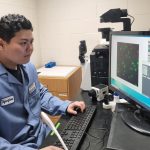Everyday Glucose Monitors Can Detect COVID-19 Antibodies

Story by Vanessa Watsa and was posted September 24, 2020 on the Hub.
A trio of Johns Hopkins scientists—a pharmacologist, a biomedical engineer, and a biophysicist—are pooling their knowledge to design a device that can detect whether a person has antibodies linked to SARS-CoV-2, the virus that causes COVID-19. Antibodies are tiny proteins that the immune system produces to “remember” viral encounters and provide immunity to future infections.
To develop an antibody detector that can be deployed rapidly and inexpensively across the globe, the researchers got their inspiration from a test that is already used by millions of people: a glucose monitor.
People with diabetes use glucose monitors to measure their blood sugar levels by taking a tiny prick of blood from their finger and placing it on a paper test strip that is inserted into the monitor. This same type of tool could be reconfigured to detect glucose in a series of chemical reactions that occur when antibodies are detected in the blood, say the researchers, led by Netz Arroyo (top photo left), assistant professor of pharmacology and molecular sciences; Jamie Spangler (top photo right), assistant professor of biomedical engineering; and Taekjip Ha, Bloomberg Distinguished Professor of biophysics and biophysical chemistry, and a professor of biophysics and biomedical engineering at Johns Hopkins.
First, the researchers developed a test strip that contains the “spike” protein from the surface of the SARS-CoV-2 virus. They add a drop of blood from a patient, and the spike proteins on the test strip bind with COVID-19-related antibodies present in the blood. Then, the researchers dip the strip into a tube with an enzyme that binds to the COVID-19 antibodies.
After washing off the excess enzyme, the scientists insert the strip into a solution containing a molecule that is transformed by the enzyme into glucose. Finally, a commercial glucose monitor reads the amount of glucose present on the test strip, which is a surrogate for COVID-19 antibodies present in the patient’s blood sample.
“Working on this project has been an incredible opportunity to engage with colleagues across Johns Hopkins, learn from them, and brainstorm together to produce creative solutions that address critical needs generated by the current COVID-19 pandemic,” says Arroyo. “Learning from the present and planning for the future, we are pursuing the development of a biosensing platform that will hopefully helps us better monitor infection spread for the current and future national epidemics.”
The researchers are continuing to refine and test the patent-pending technology.
Netz Arroyo is an associate faculty member and Jamie Spangler is an affiliate faculty member at the Institute for NanoBioTechnology.





